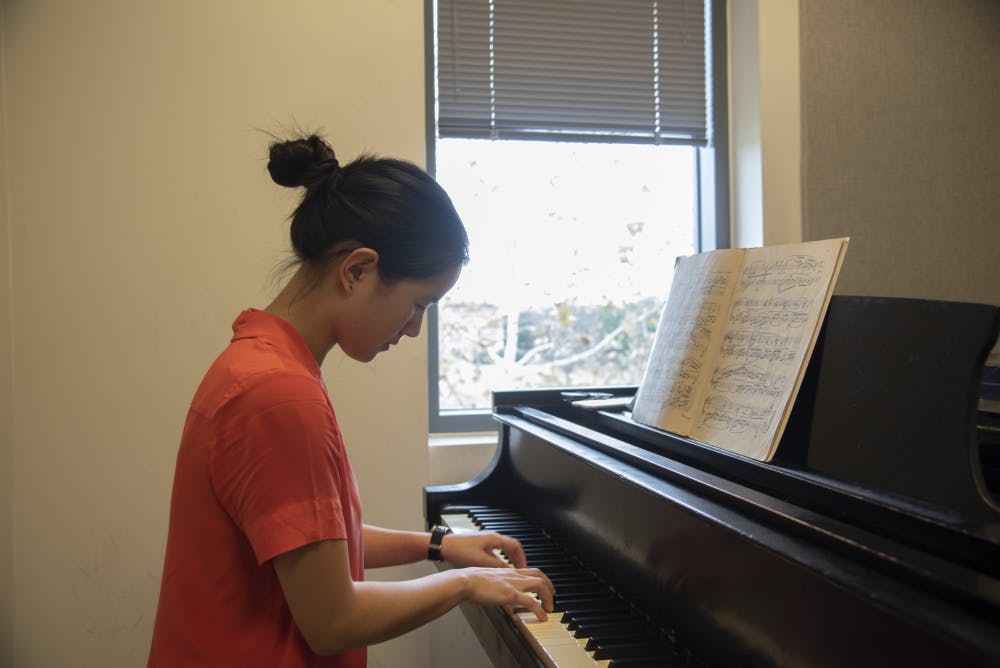Building worlds: Featuring composition major Molly Turner

Molly Turner enjoys improvising piano pieces on the spot, skillfully turning a room into a 1950s jazz club or an 18th century palace ballroom. According to Turner, however, she didn’t “get into” composition until high school. She recalls being naïve in many ways in her first year of music school — whereas a violinist may have gone through years of training, she was only just learning the art of her craft.
“Music composition for me started kind of as an improvisatory thing,” Turner, a Lovett College senior, said. “[When] I took classic[al] piano lessons and classic[al] violin lessons, I found myself just playing whatever wasn’t written down on the piano and writing whatever I was improvising down.”
Turner said that as she’s gained life experiences over her college years, she’s grown as a composer at the Shepherd School of Music.
“Music composition and what we create is about the life that we experience, so what I have experienced at this point of my life affects what I write,” Turner said. “I [feel stronger] on what my music is about, as opposed to when I first got here. I was a lot more self-conscious.”
As for her inspirations, Turner lists Bach and Stravinsky, as well as underrepresented living female composers Jennifer Higdon and Kaija Saariaho, the first female composer to have her work performed at the Metropolitan Opera House in over a century. Turner said she is most familiar with the violin and the piano, two instruments she tends to prefer.
“I’m actually a trained string player,” Turner said. “There’s a certain sustained quality about [string instruments]. The cool thing about a string instrument [is that] you can change the direction of the bow and have sound, infinitely.”
When it comes to her own composition process, Turner said there are many parameters to balance.
“My process usually starts with a graphic score,” Turner said. “It’s like a really bad stick-figure drawing of what I want my music to be. There are so many parameters — you’re thinking about how fast it is, what instruments you want to use, the kind of harmonic language that you want to use. You have to transfer that sound in your head to what that instrument has to do to what it has to look like on notation. You have to put it in notation so that someone else can also play it.”
After graduation, Turner plans to attend graduate school for conducting.
“Something I became interested in starting sophomore year is conducting,” Turner said. “There’s no undergrad conducting major — it’s really only a master’s program. [Conductors] probably start even later than composers. The best conductors are old conductors, because they’ve seen a lot, and [conducting is] seeing something on paper and knowing how to bring that to life.”
More from The Rice Thresher

Founder’s Court goes alt-rock as bôa kicks off U.S. tour at Rice
Founder’s Court morphed into a festival ground Friday night as British alt-rock band bôa launched the U.S. leg of their “Whiplash” tour. The group headlined the third annual Moody X-Fest before what organizers estimate was “a little bit over 2,000 students” — the largest turnout in the event’s three-year history.

“You need a therapist, not a keyboard”: Loretta Ross on calling in
Loretta Ross jokes that she can “talk as long as Fidel Castro.” These days, her urgency is reserved for speaking against the 'call out' — the act of public shaming as a corrective measure — which she said has become as "inevitable as gravity” during her lecture at Duncan Hall on April 14.

Review: ‘Daredevil: Born Again’ struggles with identity but shows promise
Following Netflix’s acclaimed third season of "Daredevil," expectations were understandably high for Marvel’s new Disney+ continuation, "Daredevil: Born Again." Unfortunately, the series suffers noticeably from a split personality, caught between excellence and confused mediocrity.

Please note All comments are eligible for publication by The Rice Thresher.